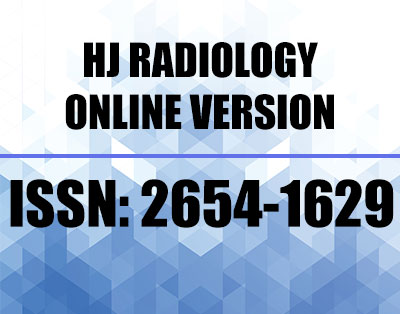The Diagnostic Performance of PSMA PET/CT In Patients With Biochemically Recurrent Prostate Cancer After Radical Treatment
Abstract
Purpose of the study: To assess the role of PSMA ligands Positron Emission Tomography and Computed Tomography (PET/CT) Scans in the biochemical recurrence of prostate cancer post radical treatment.
Materials and methods: Our prospective study included 131 males with proven biochemical recurrent prostatic adenocarcinoma. The patients’ images and data were analyzed for the rate of detection of recurrence based on PROMISE criteria. Also, correlation between the level of serum PSA and detection rate of PSMA PET/CT was analyzed. Moreover, estimation of a cutoff value for the level of serum PSA to distinguish between positive and negative PSMA PET/CT was performed.
Results: The overall detection rate was 102/131 patients (77.8 %). There was positive relation between serum PSA before the scan and the positivity of PSMA PET/CT. The most common sites of recurrence were operative bed/ radiated prostate, pelvic lymph nodes, osseous deposits, retro-peritoneal lymph nodes and visceral deposits. The cutoff value for serum PSA level to differentiate between positive PSMA PET/CT scan from a negative one to be>0.73 ng/ml.
Conclusion: PSMA PET/CT has a pivotal role in cases with biochemical recurrence after radical treatment of prostate cancer.
Keywords
PSMA PET/CT, biochemically recurrent prostate cancer.
Full Text:
PDFReferences
Ceci F, Oprea-Lager DE, Emmett L, et al. E-PSMA: the EANM standardized reporting guidelines v1. 0 for PSMA-PET. European journal of nuclear medicine and molecular imaging. 2021 May;48:1626-38.
Lawhn-Heath C, Salavati A, Behr SC, et al. Prostate-specific membrane antigen PET in prostate cancer. Radiology. 2021 May;299(2):248-60.
Wang H, He Z, Liu XA, et al. Advances in Prostate‐Specific Membrane Antigen (PSMA)‐Targeted Phototheranostics of Prostate Cancer. Small structures. 2022 Aug;3(8):2200036.
Wang Y, Galante JR, Haroon A, et al. The future of PSMA PET and WB MRI as next-generation imaging tools in prostate cancer. Nature Reviews Urology. 2022 Aug;19(8):475-93.
Artibani W, Porcaro AB, De Marco V, et al. Management of biochemical recurrence after primary curative treatment for prostate cancer: a review. Urologia internationalis. 2018 Nov 21;100(3):251-62.
Fendler WP, Calais J, Eiber M, et al. Assessment of 68Ga-PSMA-11 PET accuracy in localizing recurrent prostate cancer: a prospective single-arm clinical trial. JAMA oncology. 2019 Jun 1;5(6):856-63.
Crawford ED, Koo PJ, Shore N, et al. A clinician’s guide to next generation imaging in patients with advanced prostate cancer (RADAR III). The Journal of urology. 2019 Apr;201(4):682-92.
Trabulsi EJ, Rumble RB, Jadvar H, et al. Optimum imaging strategies for advanced prostate cancer: ASCO guideline. Journal of Clinical Oncology. 2020;38(17):1963.
Akdemir EN, Tuncel M, Akyol F, et al. 68 Ga-labelled PSMA ligand HBED-CC PET/CT imaging in patients with recurrent prostate cancer. World Journal of Urology. 2019 May 1;37:813-21.
Afshar-Oromieh A, Giesel FL, Kratochwil C, et al. Diagnostic performance of 68Ga-PSMA-11 (HBED-CC) PET/CT in patients with recurrent prostate cancer.
Hoffmann MA, Buchholz HG, Wieler HJ, et al. PSA and PSA kinetics thresholds for the presence of 68Ga-PSMA-11 PET/CT-detectable lesions in patients with biochemical recurrent prostate cancer. Cancers. 2020 Feb 8;12(2):398.
Zhou X, Jiang X, Liu L, et al. Evaluation of 18F-PSMA-1007 PET/CT in prostate cancer patients with biochemical recurrence after radical prostatectomy. Translational Oncology. 2022 Jan 1;15(1):101292.
Ceci F, Nicolotti DG, Passera R, et al. 68Ga-PSMA-11 PET/CT in prostate cancer patients with biochemical persistence after radical prostatectomy. Detection of cancer locations and impact on subsequent therapy.
Lengana T, Lawal I, Van Rensburg CJ, et al. The Diagnostic Performance of 18F-PSMA-1007 PET/CT in Prostate Cancer Patients with Early Recurrence after Definitive Therapy with a PSA<10 ng/mL. Nuklearmedizin-NuclearMedicine. 2022 Apr;61(02):120-9.
Rahbar K, Afshar-Oromieh A, Seifert R, et al. Diagnostic performance of 18 F-PSMA-1007 PET/CT in patients with biochemical recurrent prostate cancer. European journal of nuclear medicine and molecular imaging. 2018 Nov;45:2055-61.
Ilhan H, Kroenke M, Wurzer A, et al. 18F-rhPSMA-7 PET for the detection of biochemical recurrence of prostate cancer after curative-intent radiation therapy: a bicentric retrospective study. Journal of Nuclear Medicine. 2022 Aug 1;63(8):1208-14.
Watabe T, Uemura M, Soeda F, et al. High detection rate in [18 F] PSMA-1007 PET: Interim results focusing on biochemical recurrence in prostate cancer patients. Annals of Nuclear Medicine. 2021 Apr;35:523-8.
Giesel FL, Knorr K, Spohn F, et al. Detection efficacy of 18F-PSMA-1007 PET/CT in 251 patients with biochemical recurrence of prostate cancer after radical prostatectomy. Journal of Nuclear Medicine. 2019 Mar 1;60(3):362-8.
Eisenhauera EA, Therasseb P, Bogaertsc J, et al. New response evaluation criteria in solid tumours: Revised RECIST guideline (version 1.1). Eur J Cancer. 2009 Jan;45(2):228-47.
Witkowska-Patena E, Giżewska A, Dziuk M, et al. Diagnostic performance of 18F-PSMA-1007 PET/CT in biochemically relapsed prostate cancer patients with PSA levels≤2.0 ng/ml. European Congress of Radiology-ECR 2020.
Mingels C, Bohn KP, Rominger A, et al. Diagnostic accuracy of [18F] PSMA-1007 PET/CT in biochemical recurrence of prostate cancer. European journal of nuclear medicine and molecular imaging. 2022 Jun;49(7):2436-44.
Aydin AM, Haberal B, Artykov M, et al. Clinicopathological predictors of positive 68 Ga-PSMA-11 PET/CT in PSA-only recurrence of localized prostate cancer following definitive therapy. Annals of Nuclear Medicine. 2019 May 1;33:326-32.
DOI: http://dx.doi.org/10.36162/hjr.v9i2.605
Refbacks
- There are currently no refbacks.







